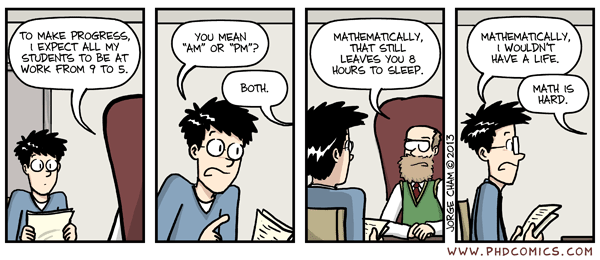Depending on who you ask, there seems to be 2 conflicting ideas about PhD lifestyles. Some believe PhD students work all the hours of the day, through the nights and at weekends with very few days off. Others might argue that we're spinning our wheels, working short days and wasting time before we have to go and get a 'proper' job. As with most things there is arguably a slight ring of truth in both versions, but really neither are fully correct. I don't work all hours, and would not call what I do wasting time. I tend to work from 8:30am to somewhere between 4:30pm and 5:10pm (so pretty much standard working hours), but I have had a few short spells of working overtime (which was not very fun). But really, for me doing my PhD has been very much like any other job really, but with the benefit of having relatively unrestricted flexitime.
 |
| From PhD Comics purveyors of humour and home truths. |
Now I'm not going to say there isn't someone somewhere who works every weekend in order to hopefully finish their PhD, and I actually know of one person who works really long days (11 hours +) because they just absolutely love their project and actually want to be in the lab all the time. But, in my experience, this is not the normal state of affairs. What seems to be more usual is that most of the time PhD students work normal hours, but every so often you'll have everything happening at once and will have to spend a couple of weeks or so working all the hours you can, in order to fit everything in. When do these times crop up? Well they tend to appear at the end of the year when you have a lovely report to work on (see 'So what exactly did you do this year?'). I had a month of long days and weeks when I was writing my first year report, but other than that I've not had any other real nightmare stretches.
On the other side PhD working culture coin is the slacker. Is it actually possible to get through a PhD by hardly working? Oh no. No, no, no, no, no. Now, I think its fair to say that we all have quiet weeks in between experiments, where we're in limbo without a large pile of work stacking up for us. I've had points where I've been waiting for equipment to be fixed and although I worked on other things, my days weren't quite as full as they normally are. But can you sit back and take it easy all the time? Nope. You'll get kicked in some form, either kicked out or kicked up the bum to actually do some work. If you get a kick up the bum, maybe then you might end up not having enough time in normal working days to get everything done, becoming the quintessential overworked PhD student after all, an interesting thought don't you think?However, I would not advise coasting along until you need to suddenly knuckle down, its not going to be fun in the long run.
Like many things, PhD workloads come in cycles. The busy times don't last forever and neither do the quiet ones. All you can do is power through as much as you're able and remember that things will go back to normal hopefully sooner rather than later.
No comments:
Post a Comment